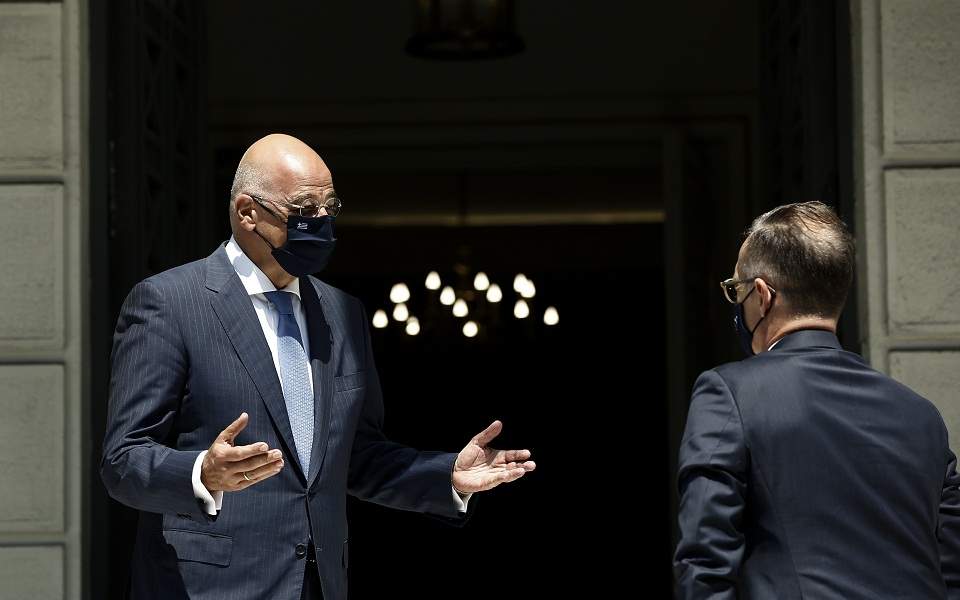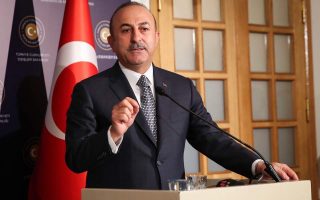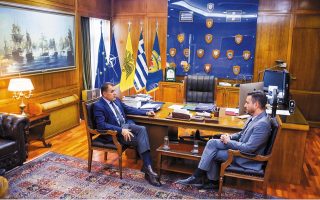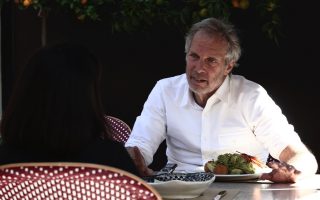Turkey must seize opportunity to de-escalate tension, Greek FM says

Greek Foreign Minister Nikos Dendias is urging Ankara to seize the opportunity presented by talks scheduled to take place at the foreign ministry level with Athens over the next few days, saying that they are a useful channel of communication amid heightened tension between the two neighbors.
In an interview with Kathimerini’s Sunday edition, ahead of a visit to the United States with Prime Minister Kyriakos Mitsotakis, Dendias stressed that Greece will defend its national sovereignty with “all the powers and legal means” at its disposal, adding that delineating exclusive economic zones with Italy and Egypt is likely.
You have embarked on a diplomatic marathon from day one of Turkey’s escalation of tension in the Eastern Mediterranean. Is it bringing results?
Greece consistently seeks dialogue, good-neighborly relations and cooperation between the states in the region. These are fundamental conditions for prosperity and stability in this incredibly troubled corner of the world where we live. However, we must take the necessary measures when our neighbor exhibits transgressive behavior. All the important diplomatic initiatives we have recently taken belong in this context and they are clearly yielding results. Our positions have gained public support from the European Union, the United States, Russia, Egypt, Israel and from certain Gulf countries, among others. These positions are founded in international law, which is something we stress when speaking to our allies and partners, with whom we are in constant communication. In contrast, Turkey’s positions have been condemned absolutely as being outside the framework of the law by the entirety of the international community. By its constant provocations, Turkey has only managed to isolate itself and be labeled as the troublemaker in a region that now more than ever needs positive initiatives that bolster security and stability. It is time, I think, that it acknowledged that a change of course would also be in its own best interest. We are open to Turkey also being a part of all our initiatives.
We often say that Turkey has consistent foreign policy goals. Apart from its constant efforts to contain Turkish ambitions, does Greece have a long-term foreign policy that transcends party lines?
I ask you to consider, despite what is said from time to time about Turkey’s and Greece’s foreign policy, what has each ultimately accomplished? Cyprus’ accession to the EU, and without a reunification agreement, is a major success for Greek diplomacy. Our country, meanwhile, has emerged as an undisputed pillar of stability in the Balkans and the East Mediterranean, a reliable partner in the international community of nations. It is working actively and methodically toward creating conditions for prosperity, growth and regional stability, a fact that is recognized by all our international partners. Turkey, in contrast – which claimed to want “zero problems with neighbors” – has created problems with every single one of its neighbors, without exception. Greece is emerging from a major crisis and making a confident comeback on the international stage, shaping a new national vision and redefining its role as a core member of the EU and NATO. I am happy to note that despite our occasional differences, there is a nonpartisan approach to the main parameters of our foreign policy. This is a significant asset that is being capitalized on by Kyriakos Mitsotakis’ government and will continue to be, so as to respond to the challenges facing our nation in an atmosphere of consensus and a spirit of national unity.
Do you see the likelihood of an exclusive economic zone being delineated with countries like Italy and Egypt, with whom relevant talks have been under way for several years?
Following contacts with my counterparts Mr [Luigi] Di Maio [of Italy] and Mr [Sameh] Shoukry [of Egypt], we agreed to pick up where negotiations have left off. The first round has already taken place with Italy in Rome, as you know. Similar talks between technical delegations will also be held with Egypt over the next few days in Athens. These talks are being carried out in a favorable climate, with friendly countries that, like us, want a cordial understanding. Furthermore, all sides acknowledge the tangible benefits of such delineation agreements. We are, therefore, working toward this and will continue to do so, as we are committed to achieving similar agreements with all the countries in our region, always within the context of international law. In response to your question, therefore, there is certainly a likelihood of delineation with these countries.
A few months ago Greece and the US renewed the defense cooperation pact that has defined defense ties between the two countries for the past 30 years. What can Greece expect from the US with regard to Turkish provocations?
Turkish violations of the Law of the Sea and the destabilization these are causing in the Eastern Mediterranean are obviously against the vital regional interests of the US and other strategic partners of Washington in the area, which is why they have repeatedly condemned Turkey’s provocative activities. What Greece adds to the equation is its position as a pillar of stability, predictability and reliability in the region. I believe that our allies on the other side the Atlantic are aware of the importance of safeguarding peace and stability and eliminating violations or transgressions in an area where the elements of instability are multiplying. The East Med Act was passed just a few days ago and I believe that this very important development also reflects the increased importance being assigned to our region by our American friends.
No demands, no concessions
Greece also recently signed an agreement for the construction of the EastMed gas pipeline in what is an example of increasingly close cooperation with Israel. Could a new government there come March affect the relationship forged over the last decade?
Our relations with Israel are strategic and extend to many areas, beyond energy, and both sides are investing in further deepening cooperation. Nothing will change in this respect, regardless of political changes, here or there. The EastMed pipeline you mention is one of the highlights of our cooperation, with a geopolitical significance that transcends domestic politics. It is a financially sustainable venture that will provide a safe conduit for East Mediterranean energy reserves, while bolstering European energy security and elevating Greece into an important energy hub. And I don’t just mean existing reserves. I remind you that the area has attracted interest from international energy giants because of its prospects as a promising energy source. However, none of the choices in this area is dictated purely by financial concerns. Israeli Prime Minister [Benjamin] Netanyahu was in Athens last week and we had the opportunity to exchange views on how our cooperation can be further extended by building on the positive dynamic of recent years.
What will happen if Turkey makes good on its threats and proceeds with exploratory drilling south of Crete on the basis of the maritime delineation deal it signed with Libya’s Tripoli-based government?
I repeat: It is our constitutional duty to defend, with all our powers and legal means, our national sovereignty. The fact that Greece is reacting to these provocations calmly should not be mistaken for a lack of determination or willpower to do our duty. Either way, I hope it does not come to that, because I am convinced that Turkey fully understands that it would be in neither side’s interest.
Is renewed talk about taking recourse to the International Court of Justice realistic or simply the result of the heightened tension in the Eastern Mediterranean?
Let’s be clear: Greece is not afraid of international justice because it is convinced of the legitimacy and justice of its positions. International law is our response to gunboat diplomacy. It’s in the fabric of our foreign policy. Of course, for there to be any real outcome from taking recourse to The Hague, the two sides need to sign an arbitration agreement that will outline the issues on which the court will be asked to rule. In any case, we are not there yet. It will take contacts and talks between the two sides. The lines of communication need to stay open. Political consultations between officials of the two foreign ministries, which are expected to resume in the next few days, are a useful channel that I hope will be used. The climate is doubtlessly heavy and this is not helping. The other side needs to understand that its stance is counterproductive, undermining security and stability in the region but also the prospects of dialogue. I hope that Turkey seizes this opportunity and uses it to genuinely restart relations with us, as was the desire of the Mitsotakis government from the very outset, abandoning its provocation tactics.
Given Turkey’s deployment in Libya and the Ankara-Tripoli agreement that challenges Greek sovereign rights, is the usual analysis of Turkey’s motivations perhaps inadequate? Does Greece need to redefine its strategy toward its eastern neighbor?
The Ottoman-style ambitions being expressed by modern Turkey have no place in 21st century realities. And they are not just of concern to Greece. They are of profound concern to the EU, in the Gulf, the Middle East and North Africa. The senseless expansionism Turkey appears to be engaging in, either by force or as the self-proclaimed defender of Muslims the world over, seems only to be leading it to international isolation. Foreign relations in the modern age are defined by international law, not gunboat diplomacy. Greece does not have any demands nor will it make any concessions on its sovereign rights. It believes steadfastly in dialogue and hopes to stand beside a modern and thriving Turkey and supports its European prospects. But it is also designing and planning alternative scenarios based on multiple variables.
The real question is whether Turkey itself continues to want the Western modernization and European prospects that can only come via the path of good-neighborly relations and international legitimacy. We could have a very different relationship with Turkey. Our two peoples have a lot of sympathy for each other and many common characteristics, including the importance we both attach to the notion of hospitality. I was in Turkey over the Christmas holidays and was very warmly received by people in the streets and restaurants of Istanbul, and I believe that these ties, the ones between our people, have some very valuable lessons to teach us that can lead to a better understanding.
Greek steps in wake of EastMed deal
How does Athens plan to respond to the faits accomplis Ankara is trying to establish in the Eastern Mediterranean?
Illegal actions do not set a precedent for the simple reason that they do not produce legal results. International law ultimately prevails.
As you know, we are in constant contact and talks with all our partners and friends in the area, which are also concerned about Turkey’s illegal activities in the Eastern Mediterranean. During my recent visits to a series of Arab countries, I realized that they share our very valid concerns about the consequences of certain actions on regional security and stability. Some have even done so publicly and in writing, to the United Nations.
Greece has consistently supported – occasionally on its own – Turkey’s European aspirations, as we believe that a European Turkey is in everyone’s interest – Turkey’s and Turkish society’s first and foremost. I am incredibly saddened by the fact that, as a result of its own choices, these prospects appear to be waning.
As for our diplomatic campaign, it will continue at this intense pace.
Last Thursday we signed with Cyprus and Israel the historic EastMed pipeline construction deal, a long-term project that will change the European energy map while also strengthening the regional geopolitical balance of power. This is being followed by a series of contacts, meetings and visits by the prime minister and myself which we believe will further strengthen our diplomatic tools against Ankara’s illegal and arbitrary actions.





